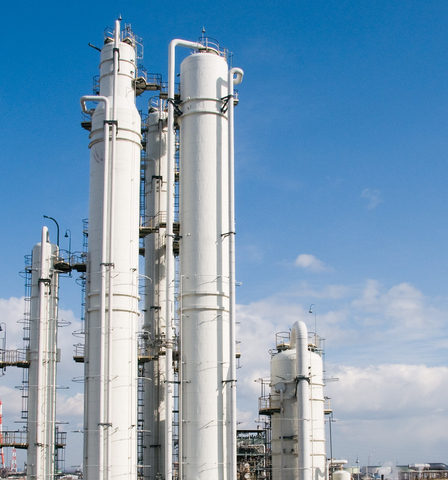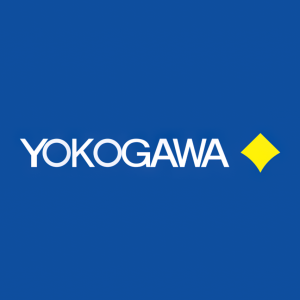In a World First, Yokogawa’s Autonomous Control AI Is Officially Adopted for Use at an ENEOS Materials Chemical Plant
– One year of stable operation demonstrates this next-generation control technology can decrease environmental impact, achieve stable quality, and transform operations –

Distillation columns at the ENEOS Materials chemical plant (Photo:
Over a 35 day (840 hour) consecutive period, from
In this field test, the autonomous control AI demonstrated the following four benefits:
-
Year-round stability
The autonomous control AI maintained stable control of the liquid levels and maximized the use of waste heat, even in winter and summer weather, with external temperatures changes by about 40ºC. No problems were observed, and stable operation and high product quality was achieved throughout the field test. -
Reduced environmental impact
By eliminating the production of off-spec products, the autonomous control AI reduced fuel, labor, and other costs, and made efficient use of raw materials. While producing good quality products that met shipment standards, the autonomous control AI reduced steam consumption and CO2 emissions by40% *4 in comparison to conventional manual control. -
Lightened workload and improved safety
The autonomous control AI eliminated the need for operators to perform manual inputs. This not only decreased workload and helped to prevent human error, it also reduced mental stress levels and improved safety. -
Robustness of the AI control model
Even after modifications were made at the plant during a routine shut-down for maintenance and repair, the same AI control model could remain in use.
ENEOS Materials found over the course of this one-year verification process that the autonomous control AI was a robust system that could achieve stable performance and optimize operations throughout the year, including in winter and summer. The company will look into applying this AI to other types of processes and plants, and will continue working to improve productivity and save energy by expanding the scope of autonomization.
To promote plant autonomization, on
Going forward, ENEOS Materials and Yokogawa will continue to work together and investigate ways to carry out digital transformation (DX) through the use of AI for control and condition-based maintenance in plants.
“Amidst severe challenges impacting the petrochemical industry such as the retirement of experienced personnel who help to ensure the safe operation of facilities, we are pleased with this demonstration of the use of AI to autonomously control processes that had previously been controlled manually. In addition to reducing operator workload, this test, which has continued for about a year, has demonstrated that this system can operate stably without being affected by seasonal changes or regular maintenance and repairs, and can save energy and reduce GHG emissions. Through smart production, we will continue to strive for safety and stability, decarbonize operations, and enhance competitiveness.”
“The key to reinforcement learning is how the reward function is designed. By closely incorporating process industry control knowledge in the reward function, it is possible to create an AI control model with a high level of reliability and validity that is able to achieve year-round stable operation. The fact that this field test confirmed the model’s ability to be applied as is even after the performance of regular maintenance and repair implies the robustness of the AI control model. I believe that FKDPP, a new control technology that can handle complex conditions, will make broad-ranging contributions to the development of industry around the world.”
“I am very grateful to have been able to work alongside our customer to take up the challenge of this globally unparalleled autonomization initiative. Given the difficulty of controlling operations in actual plants due to the complex effects of physical and chemical phenomena, there are many areas where highly-experienced operators have still had to intervene. With a focus on products and consulting, Yokogawa will develop and expand the use of autonomous control AI, and work with our customers to drive their decarbonization, digital transformation, and autonomization efforts.”
*1 |
Yokogawa defines autonomous control AI as AI that deduces the optimum method for control independently and has a high level of robustness enabling it to autonomously handle, to a certain extent, situations that it has not previously encountered. |
*2 |
Based on comprehensive secondary research of publicly available resources by IoT Analytics, performed in |
*3 |
|
*4 |
In comparison to the amount of steam previously used to maintain the liquid level and the corresponding amount of CO2 emissions. |
*5 |
|
*6 |
As the world’s first commercially available reinforcement learning AI service for edge controllers. Based on comprehensive secondary research of publicly available resources by IoT Analytics, performed in |
About
ENEOS Materials is engaged in the research and development, manufacturing, and sales of synthetic rubber, thermoplastic elastomers, latex, and other raw materials for the automobile industry and other industries around the world. Formed on
About Yokogawa
Yokogawa provides advanced solutions in the areas of measurement, control, and information to customers across a broad range of industries, including energy, chemicals, materials, pharmaceuticals, and food. Yokogawa addresses customer issues regarding the optimization of production, assets, and the supply chain with the effective application of digital technologies, enabling the transition to autonomous operations. Founded in
For more information, visit www.yokogawa.com
The names of corporations, organizations, products, services and logos herein are either registered trademarks or trademarks of
View source version on businesswire.com: https://www.businesswire.com/news/home/20230329005001/en/
PR Section
Integrated Communications Center
Yokogawa-pr@cs.jp.yokogawa.com
Source:








